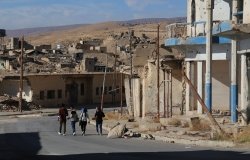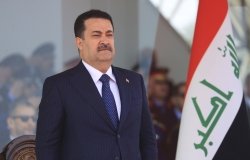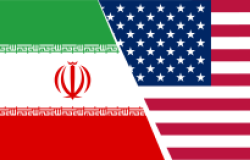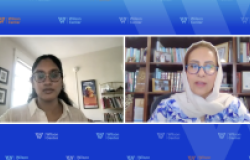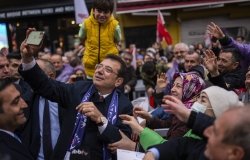Eliminating Extremism One Child at a Time
As one of the most moderate, vocal and courageous political leaders in Lebanon, Mr. Ahmad El-Assaad, will speak about the political situation in Lebanon and the region, the impact of the extremist movements, and what can be done to alleviate and ultimately eliminate these movements. He is the founder, director, and chairman of the Saving the Next Generation Foundation, an organization which offers educational and recreational opportunities to youth in the region.
Overview
Ahmad El Assaad, Leader of Lebanese Option Party (LOP), discussed the rise of extremism in the Middle East, how the United States can address it, and what his organization, Saving The Next Generation, does to educate and encourage Lebanese youth to find alternatives to extremism.
On February 2, the Middle East Program at the Woodrow Wilson Center hosted an event, “Eliminating Extremism One Child at a Time” with El Assaad. Haleh Esfandiari, Director of the Middle East Program at the Wilson Center, moderated the event.
Ahmad El Assaad began by stating that 30 years ago, extremist thinking was not as significant of a problem in the Middle East as it is today. He argued that the tension between Sunnis and Shi’as has led the region to take steps backward. El Assaad commented that the modern day interpretation of Islam perpetuated by these extremists is attractive, especially among uneducated youth. He compared the extremist movement to the communist movement in the 1960s and argued that radical groups such as ISIS and Hezbollah are gaining popularity quickly.
El Assaad noted there are three courses of action that must be taken to hinder the growth of extremist groups. First, he argued that the formation of a coherent, long-term U.S. policy dealing with the issue is essential. He emphasized that the United States must lead other states to confront the problem. Without the United States at the forefront of the issue, he believes it would be unlikely to get support from other nations. Second, El Assaad highlighted the underlying issue of countries backing terrorist organizations through monetary aid. He noted Iran’s financial support to Hezbollah and provided an estimate that Iran sends $80 to $90 million to Hezbollah monthly. El Assaad argued that the United States’ efforts to negotiate with Iran deter extremism counter-campaigns by setting a double standard. He said the negotiations show that the United States will declare Hezbollah and other radical groups to be terrorist organizations but that it also believes it is acceptable to hold negotiations with a country that supports terrorist groups. He emphasized that countries such as the United States are responsible for aiding the creation of a prosperous Middle East that is not dependent on extremist organizations for survival.
Lastly, El Assaad stressed that states must recognize what enables organizations such as ISIS to recruit young men. He argued that poverty and lack of education are at the core of the issue. He said more funding should be given to organizations similar to Saving the Next Generation—the organization founded and directed by Ahmad El Assaad and his wife Abir El Assaad—which give youth a chance at a successful future. Saving the Next Generation focuses on educating Lebanese youth about how radical teachings are detrimental to their future and their nation’s future. The organization currently sponsors 157 university students in Lebanon and four Lebanese students in the United States. El Assaad believes that it is critical to broaden the horizons of underprivileged youth through courses on technology and English, cultural documentaries, and advisory sessions about majors and future careers. Saving the Next Generation does this to ensure that extremism is not the only option youth can turn to for survival.
In the question and answer portion, El Assaad stated that Hezbollah currently employs over 40,000 people. He argued a new infrastructure must be created within countries such as Lebanon that is independent from funding from terrorist organizations. He ended by stating that it is essential that these organizations are no longer supported financially in order to change the fate of those that have already joined extremist movements.
By Mirette Wahba
Speaker
Hosted By

Middle East Program
The Wilson Center’s Middle East Program serves as a crucial resource for the policymaking community and beyond, providing analyses and research that helps inform US foreign policymaking, stimulates public debate, and expands knowledge about issues in the wider Middle East and North Africa (MENA) region. Read more
Thank you for your interest in this event. Please send any feedback or questions to our Events staff.






